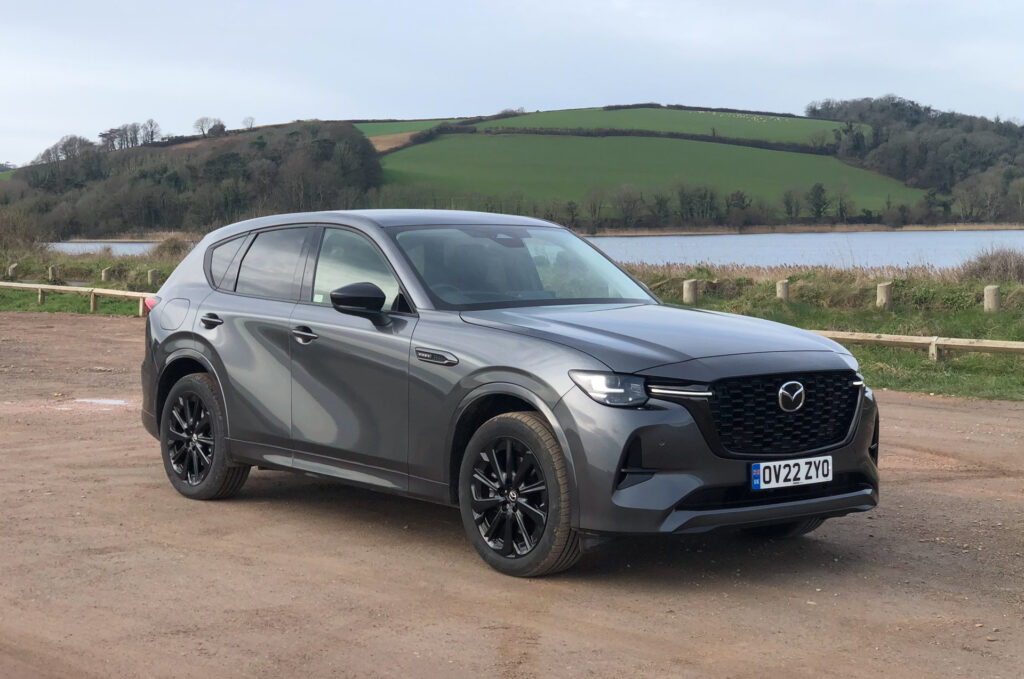- Quick Look at the 2020 Volkswagen Atlas Cross Sport | MotorTrend - March 13, 2024
- BMW Design – 2009 BMW Z4 – 2009 Detroit Auto Show - March 11, 2024
- Top 10 Car Features Women Love - October 7, 2023
We review Mazda’s new CX-60, a European-market BMW X3-sized SUV with premium aspirations
3 hours ago
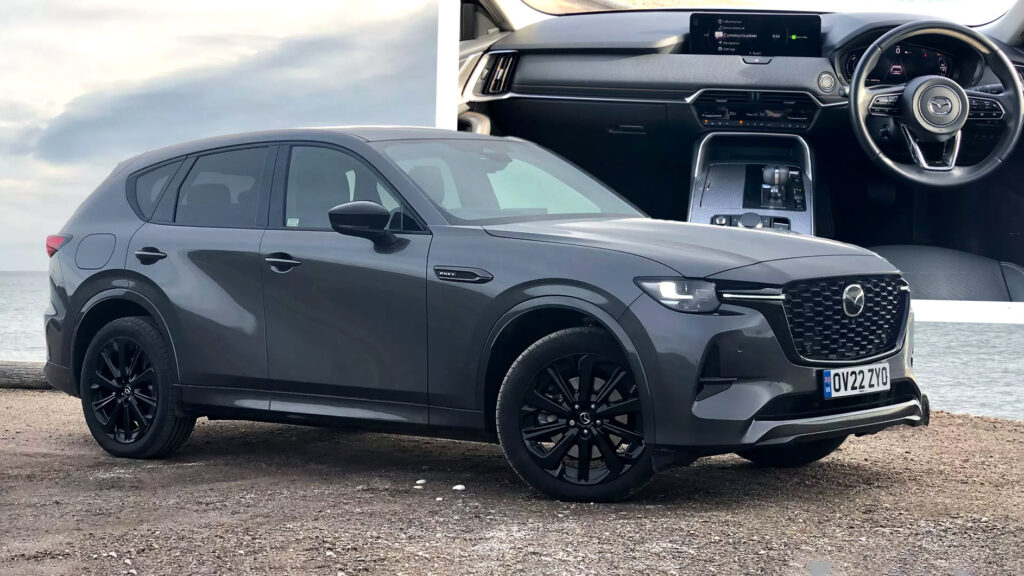
by Chris Chilton
Mazda, a company best known for the world’s favorite affordable sports car and wallet-friendly small SUVs, is branching out. It wants a slice of the lucrative premium market dominated by the likes of BMW and Mercedes, and it’s developed an entirely new family of SUVs to help make it happen.
The first of those to to hit the road is the CX-60 you see here. If you’re in Europe, Asia or Australia this BMW X3-sized SUV is either already on sale or will be in showrooms in the next few months. But North American buyers won’t be offered the CX-60 at all. Instead, they’ll get something every similar, but potentially slightly larger and wearing a CX-70 badge later this year.
So far Mazda has only teased bits of information about the CX-70 so we don’t know everything about it, though since it’s based on the same new rear-drive platform as the CX-60, will look very similar inside and out, and use much of the same chassis and drivetrain hardware, much of what we know about the CX-60 probably applies to the CX-70, and, to a lesser extent, the even bigger three-row CX-90 that Mazda revealed in January, which is also built from the same component set.
| Quick Facts | |
|---|---|
| › Model: | 2023 Mazda CX-60 PHEV |
| › Starting MSRP: | £42,990 (£48,170 for Homura PHEV tested) |
| › Dimensions: | 186.8 in. (4,745mm) L x 74.4 in. (1,890mm) W x 66.1 (1,680mm) H |
| › Power: | AWD – 323 hp (327 PS / 241 kW) and 369 lb-ft (500 Nm) Torque |
| › 0-62mph (100 km/h): | 5.8 seconds |
| › Top Speed | 124 mph (200 km/h) |
| › EV Range: | 39 Miles (63 km) |
| › On Sale: | Now in UK, Europe, Australia |
To help the CX-60 stand out against established premium rivals Mazda has given it a huge grille, and flanks that curve like a ribbon, cleverly catching light in a way that conveys an athletic look. But most striking of all is the slightly old-fashioned cab-backwards profile designed to draw attention to this SUV’s new north-south engine layout. Other existing Mazda SUVs including the large, and soon to be axed CX-9, all used a transverse engine, but the CX-60, 70 and 90 ride on a new longitudinal layout platform.
Related: 2022 Mazda CX-60 Debuts As Brand’s Most Powerful Production Car, Gets Straight-Six Engines And PHEV
That format is standard fare for the big German brands, so even if it doesn’t bring the handling benefits Mazda claims, it should give the CXs more credibility when battling the likes of BMW, as should the new range of inline six-cylinder, mild-hybrid petrol and diesel engines the new architecture allows.
advertisement scroll to continue
Six Cylinder Or Mazda’s First Ever PHEV
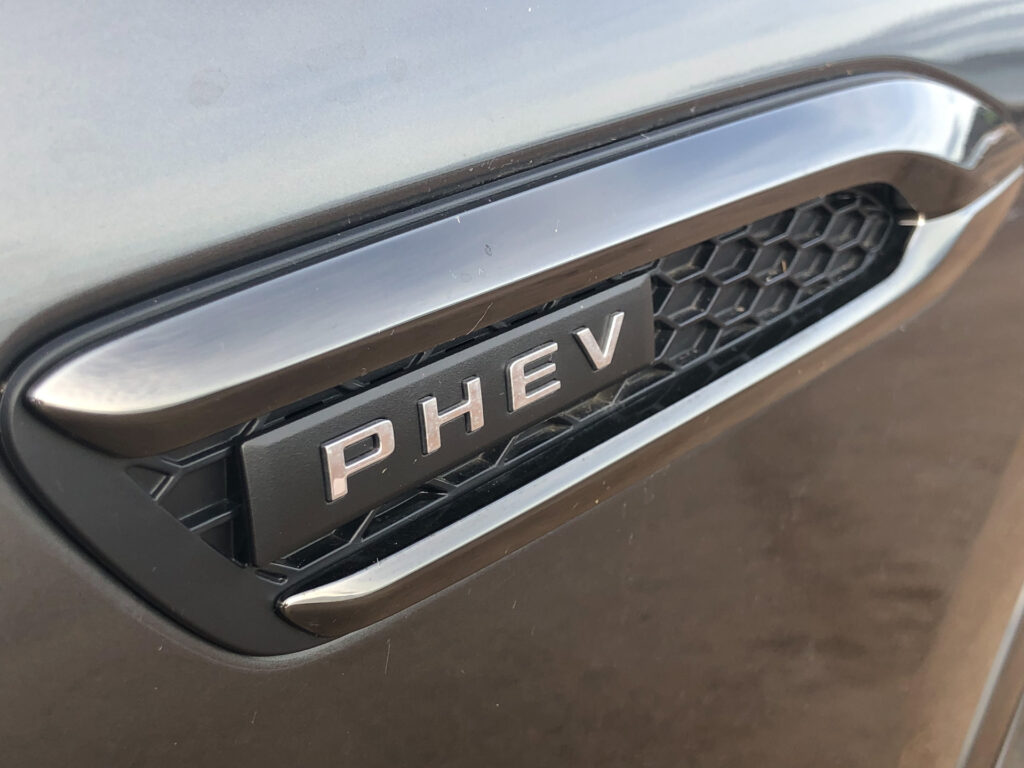
The 3.0-liter diesel makes either 197 hp (200 PS) or 251 hp (254 PS), while the 3.3 gas motor arriving in Europe this year is rated at a disappointing 276 hp (280 PS). America’s seven-seat CX-90 features a stouter 340 hp (345 PS) version of the petrol six, and it’s possible the CX-70 will get the same. But the car we’re driving, and the one that’s going to swallow up the majority of sales in the UK where I’m driving it, is the unusual PHEV four-cylinder alternative that will also be offered in the CX-70 and CX-90.
I say unusual because Mazda’s first ever plug-in hybrid mates a relatively large (2.5-liter), but naturally aspirated inline four with an electric motor, when most rivals have gone for 2.0 liters and turbos. It makes a total of 323 hp (327 PS) and 367 lb-ft (500 Nm), a good chunk of which comes from the 173 hp (175 PS / 129 kW) electric motor packaged between the petrol engine and eight-speed automatic transmission.
Decent Electric Range, Dodgy Refinement
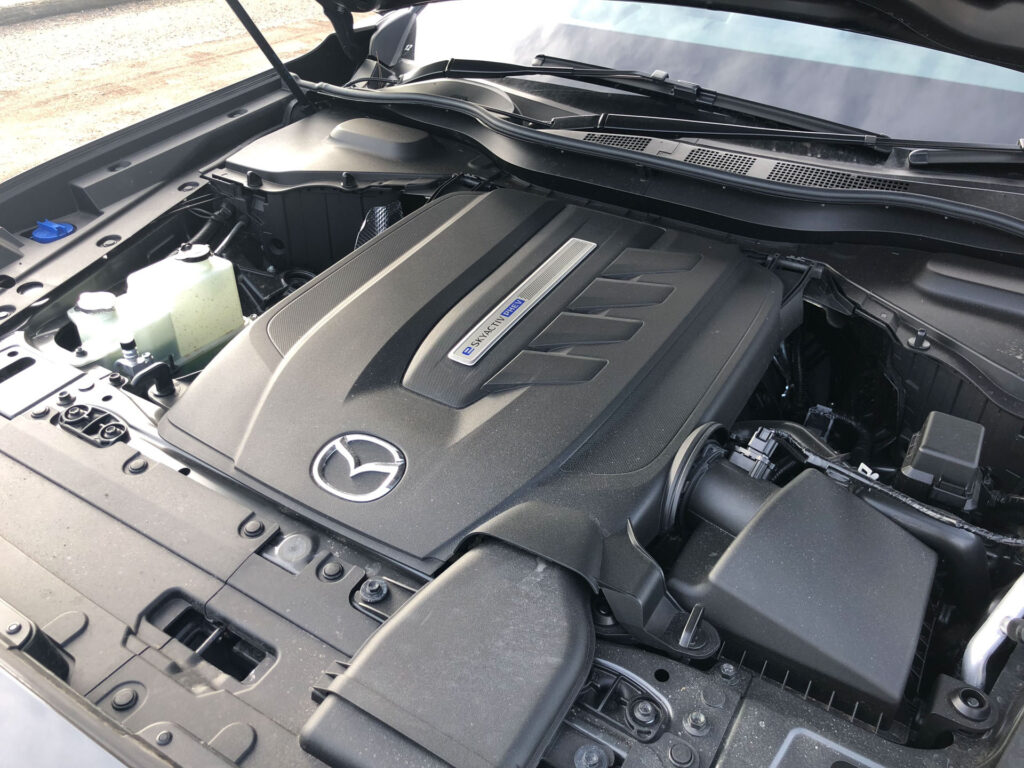
The motor draws from a 17.8 kWh battery that can be charged from a regular household socket in 7hr 50 mins or via a 7.4 kW charger in 140 mins, and gives an official WLTP range of up to 39 miles. That’s not bad, and though European WLTP figures are notoriously optimistic, I got over 32 miles out of a charge on several days that even included 70 mph cruising. Unfortunately the overall range when using both power sources isn’t so hot. I struggled to get much over 300 miles out of the 50-liter (13.2 gal U.S) tank on a fast motorway journey, even when starting with a full battery.
But worse than the economy is the refinement, or rather the lack of it. The four-cylinder engine has a fairly hard edge to it that you might call sporty if you were being charitable, and sometimes under really big loads emits a supercharger-like whine, but I suspect the six-cylinder alternative will far better fit the premium image Mazda is trying to portray. Worse than the sound though, is the terrible interplay between the ICE and electric powertrains. The car struggles most when you come on and off the accelerator in town, randomly sending huge jolts through the drivetrain, or not giving you any power then suddenly lurching forward.
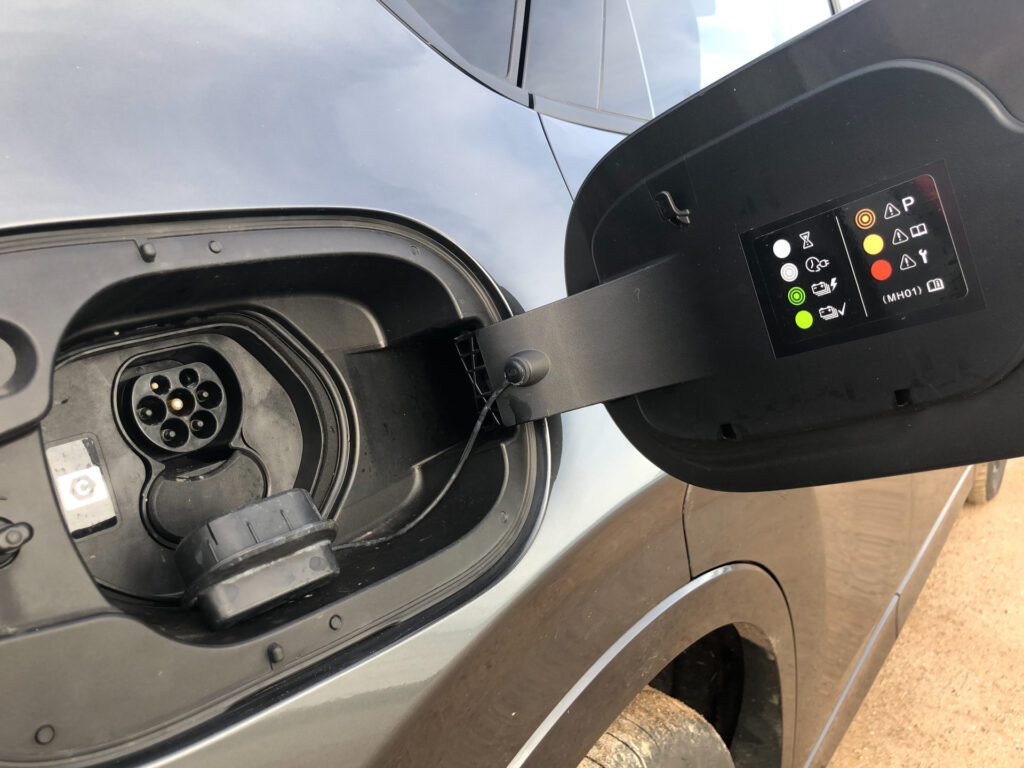
I’ll be just as surprised if Mazda dealers aren’t inundated with CX-60 buyers returning with their cars to ask if they’re really meant to feel like that. Stick to EV mode when you’ve got sufficient charge and the driving experience is smoother, though since the electric motor drives through the eight speed transmission rather than acting directly on the axle, you feel every jolt of the transmission shifts as it moves up the ratios.
Fun To Drive, But Ride Unsettled
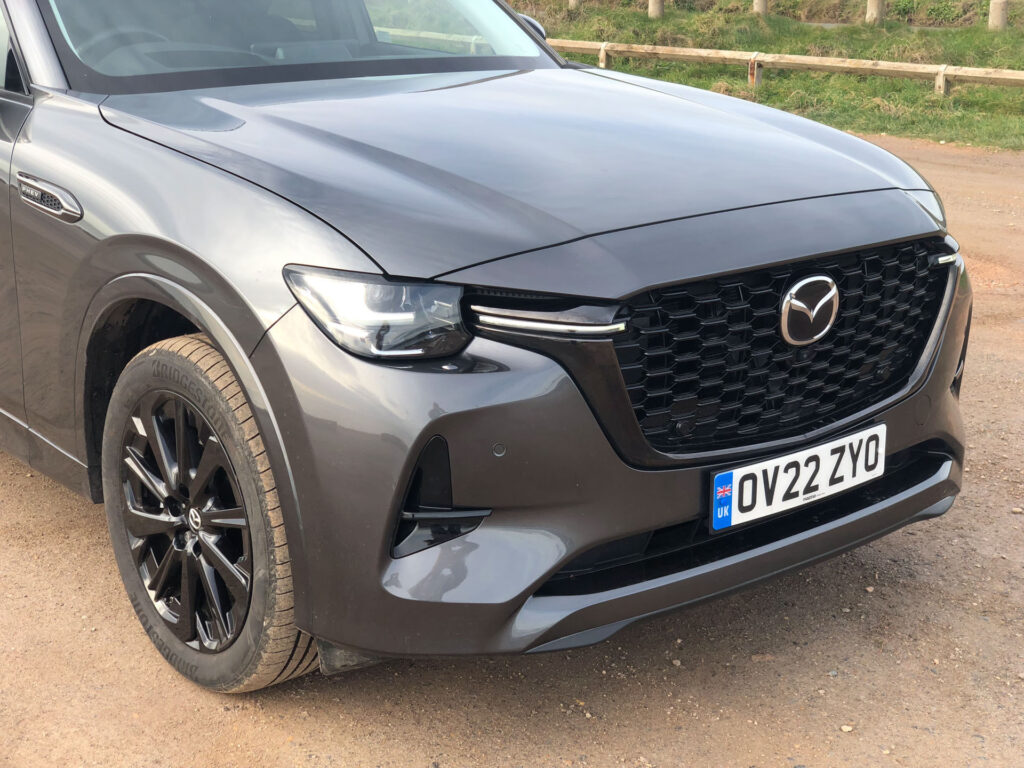
It’s a shame that the hybrid drivetrain is so jerky, because the CX-60 actually drives pretty well in other respects. There’s not stacks of steering feel, but the steering does feel responsive, just as you’d expect from a Mazda, there’s plenty of grip and the brake-based torque-vectoring feature used to nip the inside rear caliper helps the CX-60 change direction smartly. We wish Mazda had developed a set of adaptive dampers though. That would have taken the sting out of the jiggly low-speed ride and improve the high-speed body control of what is, at around 2,071 kg (4,566 lbs), a fairly heavy car. Unfortunately trick dampers are not available even as an option.
Quality Interior, But No Touchscreen
The other thing plenty of would-be CX-60 owners might be wanting but can’t have, is a touchscreen infotainment system. The CX’s stylish letterbox-format, high-resolution 12.3-in display is just begging to be prodded, but can in fact only be operated by the iDrive-style scroll wheel on the console (or your voice if you’ve got the patience). I should make clear that I love rotary controllers and hate cars that make you do everything through the screen. But there are times when each kind of control is far preferable to the other. BMW’s recently facelifted X3 gives you both options, so why doesn’t the CX-60?
The interior looks great though; overall it’s as welcoming as anything you’ll meet in a German brand’s showroom. The quality is first rate and everything is logically laid out. It’s great to see plenty of hard keys for the climate system above the smartphone charging tray, though some of those buttons are pretty small, and while we’re griping, it would be nice to see more options to configure the information available in the 12.3-in digital instrument cluster. It looks neat on first inspection, but doesn’t do much.
A CX-5 Comes Close For Space
There’s enough space for four passengers in the CX-60, but it definitely doesn’t move the game on in any way, even if higher-spec models like ours feature a Driver Personalization System that uses facial recognition to judge where to adjust the seat for you. There’s no option to slide the rear seat back and forth to give rear passengers more legroom, but there is at least plenty of cargo room thanks to the 570 liters (20.1 cu-ft) of luggage area. That’s slightly more than you get in either a Toyota RAV4 hybrid or the CX’s premium rivals, but not by enough to swing a buying decision.
Price and equipment
Related: Mazda CX-60 Gains Sporty Styling Kit From Japanese Tuner
The UK CX-60 comes in three flavors starting with the entry level Exclusive-Line (what, exclusively for tightwads?), which costs £42,990 for the low-power 197 hp diesel, £45,630 with the 251 hp diesel and £45,420 as a PHEV. The mid-spec Homara comes only with the PHEV motor (£48,170) or high-power diesel (£48,380), as does the top-spec Takumi, though inexplicably the £50,730 diesel then commands a £1,210 premium over the PHEV.
They’re all well equipped, even the base model getting keyless entry, leather trim and LED lights. But our Homura justifies its £2,750 premium over the base car with a wheel upgrade from 18s to 20s, electrically adjustable and vented front seats and heated outer rear seats, Bose HiFi and a hands-free function for the power tailgate. Top-spec Takumi’s benefits are more about style than equipment, and include a maple wood interior, white leather seats and machine-finish alloy wheels for an additional £1,350.
What’s It Up Against?
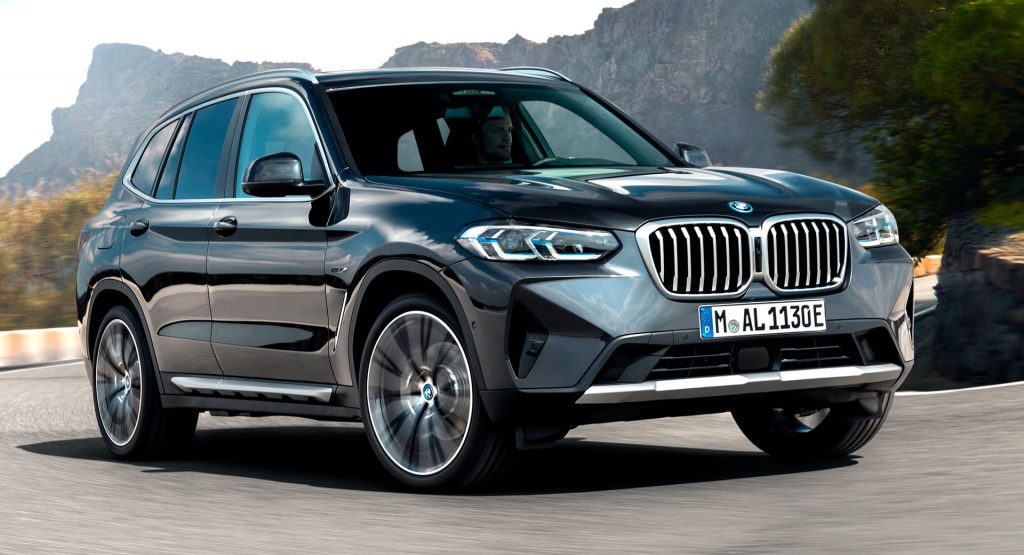
Here’s where the CX-60 hybrid makes its strongest case against not buying a BMW X3, Audi Q5 or Lexus NX. The entry-level CX-60 PHEV costs £45,420 here in the UK, versus £54,825 for the least expensive BMW X3 PHEV, and £53,000 for the equivalent Audi Q5. It’s seriously big on value, at least in Europe relative to the cars it hopes to beat.
That ‘bargain’ £45,420 equates to $54,650, which doesn’t sound so great, but since the bigger CX-90 has a confirmed starting price of $40,970 including destination, you can expect the five-seat CX-70 to be priced in the high $30k range, which would make it round $8-10k cheaper than an entry-level all-wheel drive X3.
Verdict
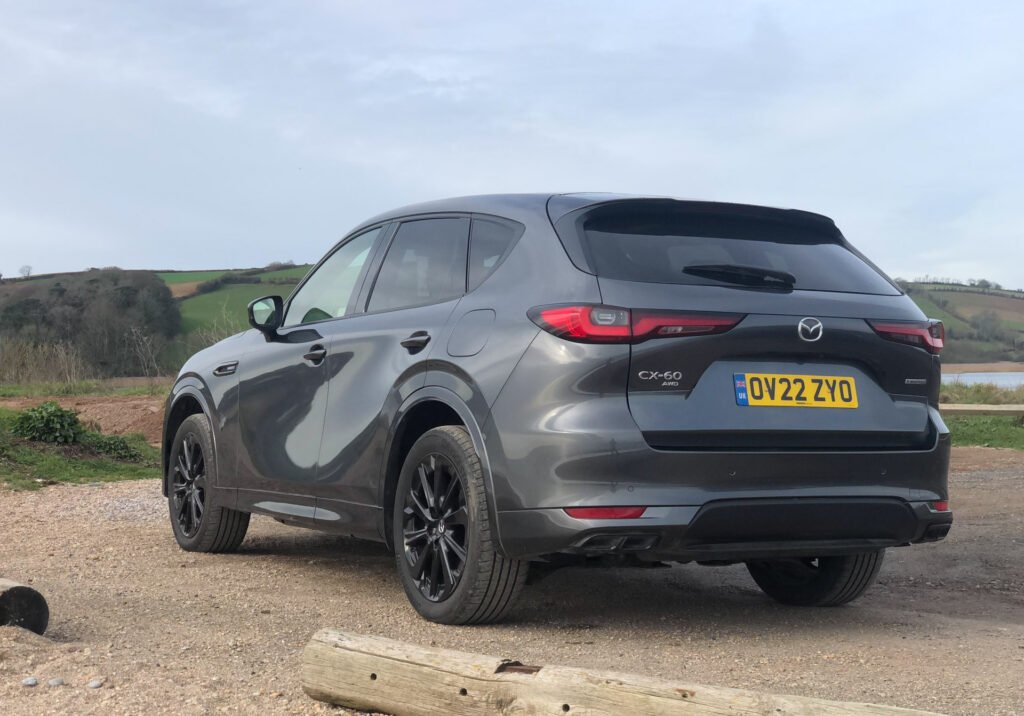
In many ways the CX-60 is a strong new entry to the premium SUV class. It might not have the badge kudos of a BMW X3 or Lexus NX, but it does have a great interior, long list of standard kit and it comfortably undercuts its rivals on price.
But the hybrid powertrain lets the side down. While it has a reasonably long EV range, its low-speed manners would be unacceptable in a cheap mass-market SUV, never mind a premium one. The UK’s company car tax structure means most buyers will feel compelled to get the hybrid, but while we haven’t driven the six-cylinder alternative engines it’s hard to believe they won’t show the CX-60 off in a better light.
We’re hanging on to this car for a few months and will be reporting more on what we like and don’t like about it. Got something you want to know about it? Drop a comment below.
